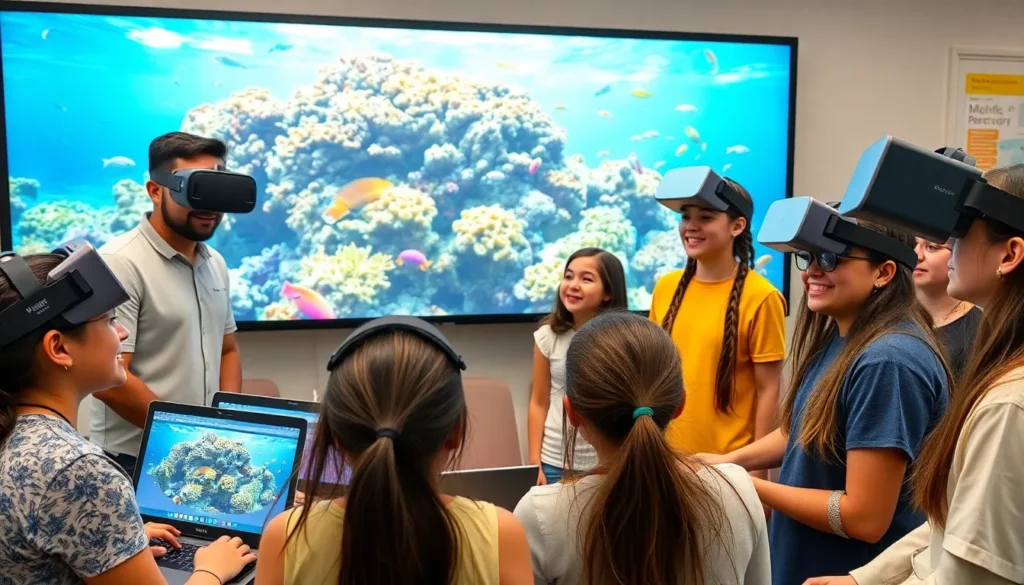Table of Contents
ToggleIn a world where the quest for knowledge often feels like a never-ending marathon, PhD opportunities stand as the holy grail for the intellectually ambitious. Picture this: you, a caffeine-fueled scholar, delving deep into your passion while wielding the title of “Doctor” like a superhero cape. It’s not just about the degree; it’s about the thrill of research, the joy of discovery, and yes, the occasional existential crisis.
But wait! Before you dive headfirst into this academic abyss, it’s crucial to understand what’s waiting on the other side. With diverse fields and funding options, the right PhD opportunity can transform your career and life. So grab your lab coat or your laptop, and let’s explore the exciting world of PhD programs that could make you the next big thing in academia—or at least the smartest person at the next dinner party.
Overview Of PhD Opportunities
PhD opportunities span various fields and disciplines, offering unique paths for research and professional growth. Individuals can pursue doctoral degrees in sciences, humanities, engineering, and more, depending on their academic interests. Many programs provide funding options, such as fellowships, grants, and assistantships, helping to alleviate financial burdens.
Identifying the right program is critical for success. Top universities often have specialized departments that match specific research interests. Engaging with faculty members during the application process can significantly enhance understanding of the program’s focus and available resources.
Networking plays a vital role in exploring PhD opportunities. Attending academic conferences allows candidates to connect with peers and potential advisors. Building relationships within academic circles can lead to collaborations and open doors for future research projects.
PhD graduates often experience various career options. Academia remains a common path, yet industry roles also appeal to many. Consulting, policy making, and research positions in both private and public sectors highlight the diverse avenues available.
Exploring geographical options broadens the scope for candidates. Many countries offer excellent PhD programs, each with distinct advantages. Students may consider programs in Europe for their unique perspectives or programs in North America for their extensive resources.
Candidates should aim to assess their personal and professional goals. Each PhD program demands commitment and dedication, making self-reflection essential. Aligning research interests with career aspirations ensures a fulfilling academic experience.
Types Of PhD Opportunities

PhD opportunities vary widely, catering to different academic and professional aspirations. Understanding these options helps candidates make informed decisions.
Research-Based PhD Programs
Research-based PhD programs focus on original investigations and the creation of new knowledge. Students engage deeply with their specific fields, conducting comprehensive research that contributes to advancements in their disciplines. Coursework typically includes research methodologies and specialized topics. Candidates often collaborate with faculty, enhancing their work through seasoned mentorship. Many programs culminate in a dissertation, a substantial piece of original research. These programs exist across disciplines, including sciences and humanities, providing varied research ecosystems.
Professional Doctorates
Professional doctorates integrate advanced academic training with practical applications in specific fields. Programs like Doctor of Education (EdD) or Doctor of Business Administration (DBA) serve professionals aiming to enhance their expertise while applying research to real-world challenges. Curriculum usually blends theoretical knowledge with practical case studies and projects. Graduates often pursue higher management positions or academic roles, leveraging their unique skill sets. Many programs emphasize networking, allowing students to connect with industry leaders during their studies. Flexibility in scheduling accommodates working professionals pursuing these degrees.
Financial Support For PhD Students
Financial support plays a crucial role in the pursuit of a PhD. Various funding options exist to ease the financial burden associated with advanced studies.
Scholarships And Grants
Scholarships and grants offer significant financial relief for PhD students. Institutions, organizations, and government agencies provide these funds based on academic merit or research potential. Many prominent universities feature dedicated scholarship programs for specific disciplines. Candidates should research eligibility criteria, application deadlines, and required materials early on. Grants can support research projects or travel for conferences, which further enhances academic experience. Diverse opportunities exist, so thorough exploration maximizes potential financial aid.
Assistantships And Fellowships
Assistantships and fellowships serve as primary financial support for many PhD candidates. These opportunities often provide stipends and tuition waivers in exchange for teaching or research assistance. Teaching assistantships typically involve leading discussions or grading assignments in undergraduate courses. Research assistantships allow students to collaborate directly with faculty on ongoing projects. Fellowships may offer funding without work obligations, focusing solely on research. Institutions and external organizations frequently list these options, offering varying stipends and benefits, which can influence the selection process. Understanding these funding avenues proves essential for effective financial planning.
Factors To Consider When Choosing A PhD Program
Selecting a PhD program requires careful consideration of several key factors. Candidates should prioritize elements that align with their academic and professional aspirations.
Program Reputation
Program reputation heavily influences future opportunities. High-ranking institutions often provide access to better resources and networks. Graduates from esteemed programs typically attract more attention from employers in academia and industry. Evaluating program rankings in specific areas can provide insights into strengths and weaknesses. Reviews and testimonials from alumni also offer valuable perspectives on the program’s quality. Engaging with current students can reveal insights that rankings may overlook. Therefore, candidates should invest time in researching various programs’ standings.
Faculty Expertise
Faculty expertise plays a critical role in shaping the PhD experience. Faculty members guide research, offer mentorship, and influence academic growth. Investigating faculty research interests helps ensure alignment with personal goals. Availability for mentorship can significantly impact candidates’ progress and success. Furthermore, prior research output and their involvement in professional circles are important indicators of faculty impact. Engaging with faculty during the application process fosters connections that enhance understanding of the program. For those pursuing niche areas, faculty expertise can make or break the decision on which program to choose.
Application Process For PhD Opportunities
Understanding the application process for PhD opportunities involves several key steps. First, candidates must select a program that aligns with their research interests and career aspirations. Thorough research on various institutions aids in identifying programs with specialized departments.
Next, candidates should prepare a strong application package. This often includes a statement of purpose, letters of recommendation, and academic transcripts. A well-crafted statement articulates research interests and personal motivations for pursuing a PhD.
Contacting potential faculty advisors demonstrates enthusiasm and initiative. Engaging in conversations can provide insights into research opportunities and departmental culture, making this step crucial. Candidates often benefit from personalizing communication with advisors, highlighting their specific interests.
Submitting applications typically occurs well ahead of deadlines. Knowing the timelines for each program ensures timely submission of materials. Awareness of funding options, including assistantships and fellowships, often accompanies this process. This knowledge can significantly ease financial burdens and enhance the overall application.
Furthermore, interviews may form part of the selection process. Candidates should prepare to discuss their research ideas and how these align with faculty interests. Practicing common interview questions can bolster confidence.
Lastly, following up on submitted applications reflects professionalism and interest in the program. Candidates might inquire about the status of their application after a reasonable time. Understanding this process equips candidates to navigate the nuances of applying for a PhD effectively.
Pursuing a PhD opens doors to a world of knowledge and opportunity. With careful consideration of fields and funding options candidates can embark on a rewarding academic journey. Engaging with faculty and networking within the academic community enhances the experience and can lead to valuable connections.
As candidates explore diverse programs and geographical options it’s essential to align their research interests with personal and professional goals. By understanding the application process and funding avenues they can navigate this path with confidence. A PhD not only represents a significant academic achievement but also paves the way for impactful career opportunities in various sectors.










